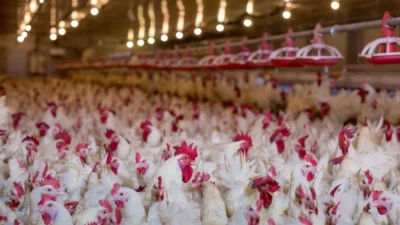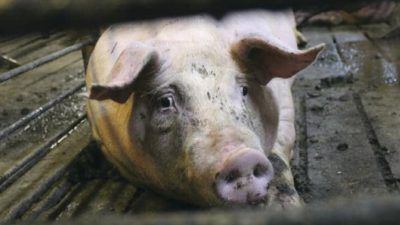
Are we hatching the next pandemic in factory farms?
Bird flu has been detected in foxes and otters in the UK, is the demand for cheap chicken increasing the risk of another pandemic?
Home » Factory farming » Page 2

Bird flu has been detected in foxes and otters in the UK, is the demand for cheap chicken increasing the risk of another pandemic?

Campylobacter is the main cause of food poisoning in the UK and it is estimated that there are more than half a million cases and 80,000 GP consultations every year in the UK. Campylobacter bacteria are prevalent in farmed animals such as chickens, pigs, cattle and sheep, and have also been found in shellfish.

Most of the meat people eat today comes from genetically uniform, immunocompromised, regularly drugged animals packed by the thousands into filthy sheds or stacked cages. The perfect environment for emerging diseases.

Scientists have been warning us for years that the next pandemic could come from a factory farm. Let’s end factory farming before it ends us!

Poultry, pigs and cows are a significant source of this food poisoning bug but they may show no signs of infection and infected foods usually look and smell normal. Factory farms provide the ideal environment for Salmonella bacteria to spread as they are shed in the faeces of infected animals.

As we are fast-approaching a post-antibiotic era, the effectiveness of antibiotics used to treat human illnesses may be reduced if pathogens and resistance genes from the agricultural environment are repeatedly, but silently, being introduced into the human population.

It’s not just dangerous viruses lurking in factory farms, such places provide the perfect environment for pathogenic bacteria to spread and evolve too.

We now rely heavily on antibiotics to treat and prevent infection but what many people don’t realise is that they are also widely used in agriculture and aquaculture. The overuse of antibiotics in humans and animals has led to the emergence of multidrug-resistant “superbugs.”

The coronavirus pandemic may have originated, it is thought, in a wet market rather than a factory farm, but the risk factors in such places are very similar.
| Cookie | Duration | Description |
|---|---|---|
| cookielawinfo-checkbox-analytics | 11 months | This cookie is set by GDPR Cookie Consent plugin. The cookie is used to store the user consent for the cookies in the category "Analytics". |
| cookielawinfo-checkbox-functional | 11 months | The cookie is set by GDPR cookie consent to record the user consent for the cookies in the category "Functional". |
| cookielawinfo-checkbox-necessary | 11 months | This cookie is set by GDPR Cookie Consent plugin. The cookies is used to store the user consent for the cookies in the category "Necessary". |
| cookielawinfo-checkbox-others | 11 months | This cookie is set by GDPR Cookie Consent plugin. The cookie is used to store the user consent for the cookies in the category "Other. |
| cookielawinfo-checkbox-performance | 11 months | This cookie is set by GDPR Cookie Consent plugin. The cookie is used to store the user consent for the cookies in the category "Performance". |
| viewed_cookie_policy | 11 months | The cookie is set by the GDPR Cookie Consent plugin and is used to store whether or not user has consented to the use of cookies. It does not store any personal data. |
